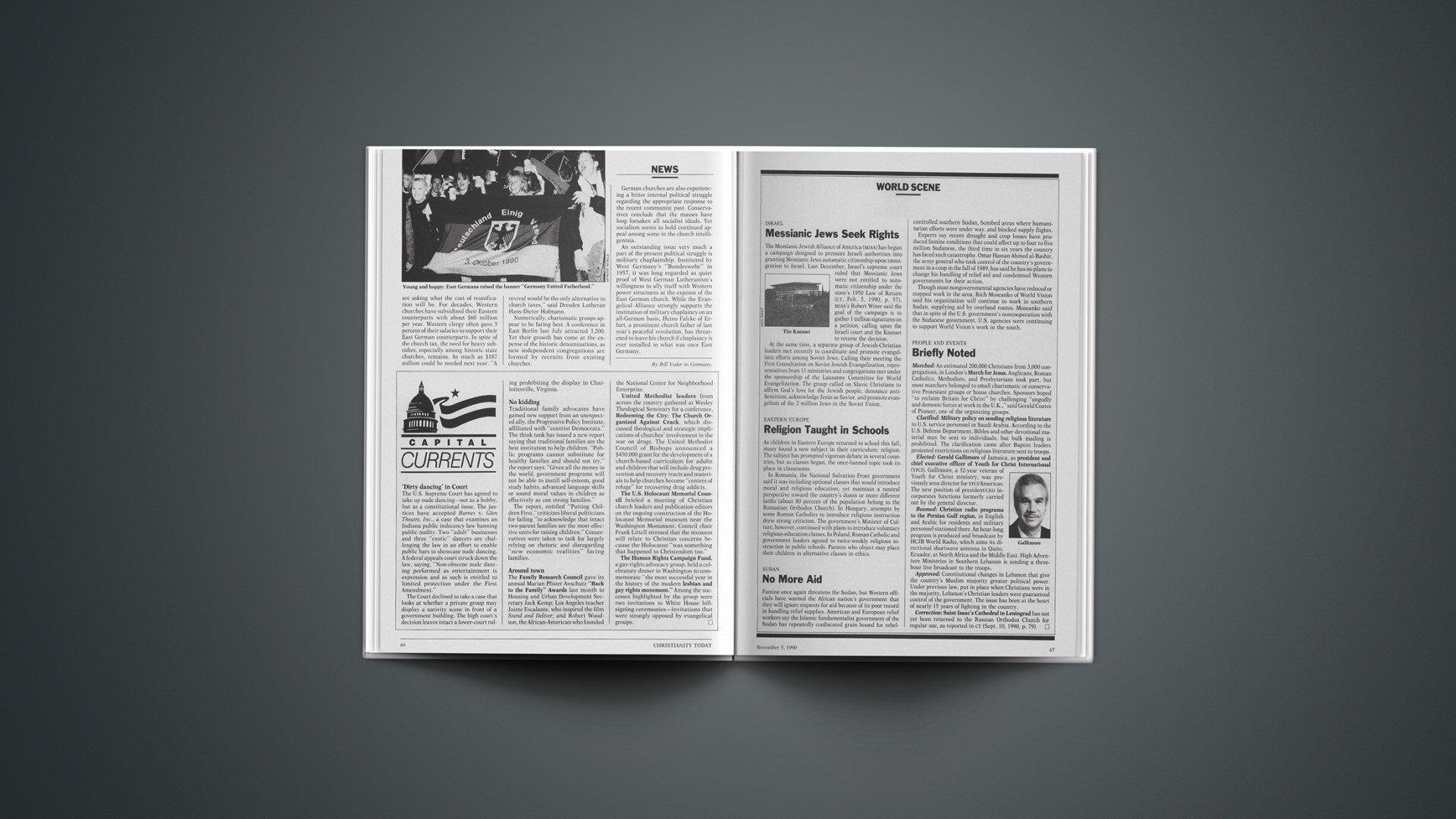ISRAEL
Messianic Jews Seek Rights
The Messianic Jewish Alliance of America (MJAA) has begun a campaign designed to pressure Israeli authorities into granting Messianic Jews automatic citizenship upon immigration to Israel. Last December, Israel’s supreme court ruled that Messianic Jews were not entitled to automatic citizenship under the state’s 1950 Law of Return (CT, Feb. 5, 1990, p. 57). MJAA’s Robert Winer said the goal of the campaign is to gather 1 million signatures on a petition, calling upon the Israeli court and the Knesset to reverse the decision.
At the same time, a separate group of Jewish-Christian leaders met recently to coordinate and promote evangelistic efforts among Soviet Jews. Calling their meeting the First Consultation on Soviet Jewish Evangelization, representatives from 11 ministries and congregations met under the sponsorship of the Lausanne Committee for World Evangelization. The group called on Slavic Christians to affirm God’s love for the Jewish people, denounce anti-Semitism, acknowledge Jesus as Savior, and promote evangelism of the 2 million Jews in the Soviet Union.
EASTERN EUROPE
Religion Taught In Schools
As children in Eastern Europe returned to school this fall, many found a new subject in their curriculum: religion. The subject has prompted vigorous debate in several countries, but as classes began, the once-banned topic took its place in classrooms.
In Romania, the National Salvation Front government said it was including optional classes that would introduce moral and religious education, yet maintain a neutral perspective toward the country’s dozen or more different faiths (about 80 percent of the population belong to the Romanian Orthodox Church). In Hungary, attempts by some Roman Catholics to introduce religious instruction drew strong criticism. The government’s Minister of Culture, however, continued with plans to introduce voluntary religious-education classes. In Poland, Roman Catholic and government leaders agreed to twice-weekly religious instruction in public schools. Parents who object may place their children in alternative classes in ethics.
SUDAN
No More Aid
Famine once again threatens the Sudan, but Western officials have warned the African nation’s government that they will ignore requests for aid because of its poor record in handling relief supplies. American and European relief workers say the Islamic fundamentalist government of the Sudan has repeatedly confiscated grain bound for rebel-controlled southern Sudan, bombed areas where humanitarian efforts were under way, and blocked supply flights.
Experts say recent drought and crop losses have produced famine conditions that could affect up to four to five million Sudanese, the third time in six years the country has faced such catastrophe. Omar Hassan Ahmed al-Bashir, the army general who took control of the country’s government in a coup in the fall of 1989, has said he has no plans to change his handling of relief aid and condemned Western governments for their action.
Though most nongovernmental agencies have reduced or stopped work in the area, Rich Moseanko of World Vision said his organization will continue to work in southern Sudan, supplying aid by overland routes. Moseanko said that in spite of the U.S. government’s noncooperation with the Sudanese government, U.S. agencies were continuing to support World Vision’s work in the south.
PEOPLE AND EVENTS
Briefly Noted
Marched: An estimated 200,000 Christians from 3,000 congregations, in London’s March for Jesus. Anglicans, Roman Catholics, Methodists, and Presbyterians took part, but most marchers belonged to small charismatic or conservative Protestant groups or house churches. Sponsors hoped “to reclaim Britain for Christ” by challenging “ungodly and demonic forces at work in the U.K.,” said Gerald Coates of Pioneer, one of the organizing groups.
Clarified: Military policy on sending religious literature to U.S. service personnel in Saudi Arabia. According to the U.S. Defense Department, Bibles and other devotional material may be sent to individuals, but bulk mailing is prohibited. The clarification came after Baptist leaders protested restrictions on religious literature sent to troops.
Elected: Gerald Gallimore of Jamaica, as president and chief executive officer of Youth for Christ International (YFCI). Gallimore, a 32-year veteran of Youth for Christ ministry, was previously area director for YFCI/Americas. The new position of president/CEO incorporates functions formerly carried out by the general director.
Beamed: Christian radio programs to the Persian Gulf region, in English and Arabic for residents and military personnel stationed there. An hour-long program is produced and broadcast by HCJB World Radio, which aims its directional shortwave antenna in Quito, Ecuador, at North Africa and the Middle East. High Adventure Ministries in Southern Lebanon is sending a three-hour live broadcast to the troops.
Approved: Constitutional changes in Lebanon that give the country’s Muslim majority greater political power. Under previous law, put in place when Christians were in the majority, Lebanon’s Christian leaders were guaranteed control of the government. The issue has been at the heart of nearly 15 years of fighting in the country.
Correction: Saint Isaac’s Cathedral in Leningrad has not yet been returned to the Russian Orthodox Church for regular use, as reported in CT (Sept. 10, 1990, p. 79).










